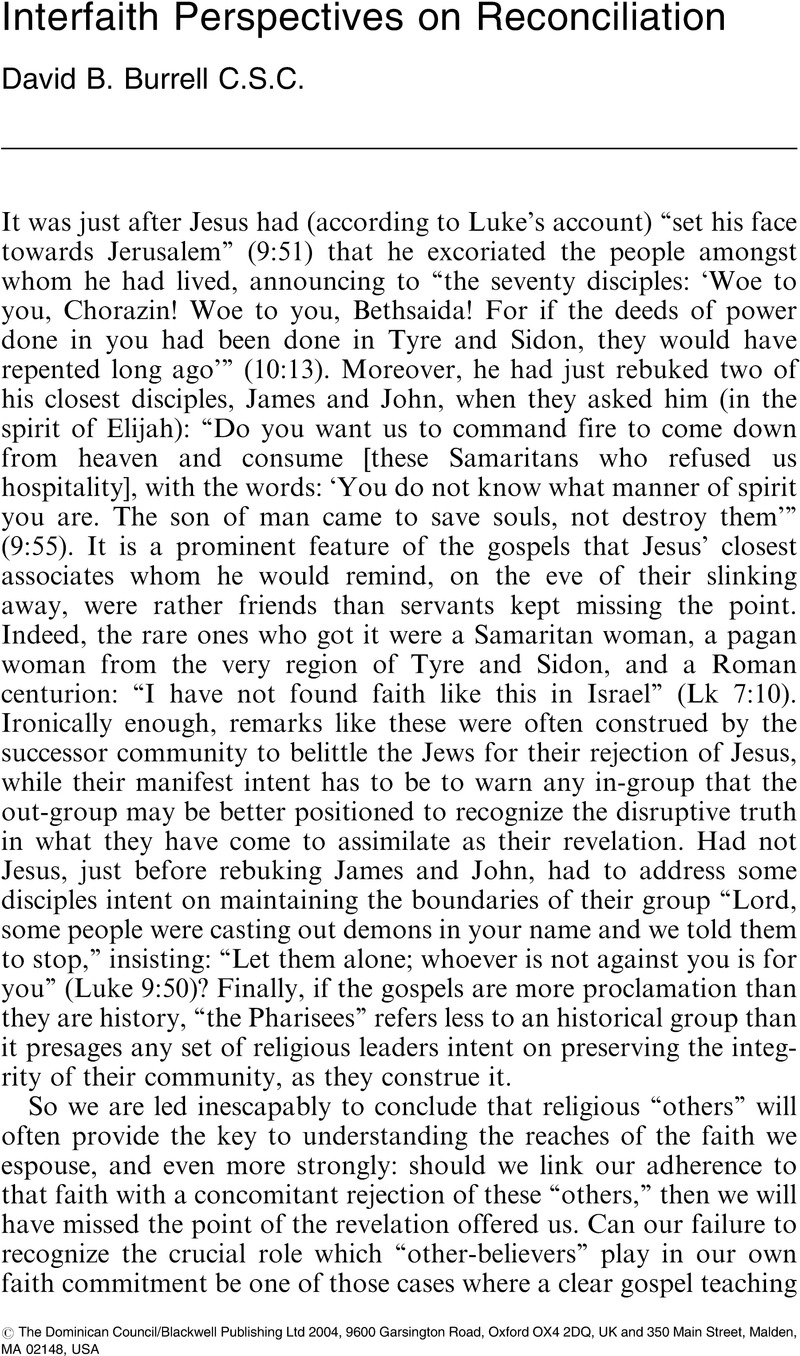Published online by Cambridge University Press: 01 January 2024

1 This is the burden of Karl Rahner's celebrated “world-church” lecture, published in Theological Studies 40 (1979)as “Towards a Fundamental Interpretation of Vatican II.”
2 Nostra Aetate, par 3..
3 On his issue, see DiNoia, Augustine O.P., Diversity of Religions(Washington DC: Catholic University of America Press, 1992)CrossRefGoogle Scholar, D’Costa, Gavin, Theology and Religious Pluralism(New York: Oxford, 1986)Google Scholar, and Griffiths, Paul: Problems of Religious Diversity(Malden, MA / Oxford: Blackwell, 2001)Google Scholar.
4 What Paul Griffiths calls “the neuralgic point of creative conceptual growth for Christian thought”(Problems, 97). Why else would it prove ‘neuralgic’ except for this propensity?
5 New York: Simon and Schuster, 1970; 1–5.
6 Summa Theologiae 1.13.5, with an illuminating Appendix to the Blackfriars’ edition by Herbert McCabe on “imperfect signification”(New York: McGraw-Hill, 1965); see my “Maimonides, Aquinas and Ghazali on Naming God,” in Ochs, Peter, ed., The Return to Scripture in Judaism and Christianity(New York, NY: Paulist Press, 1993) 233–55Google Scholar.
7 The God of Faith and Reason(Washington DC: Catholic University of America Press, 1989)Google Scholar; for an extended reflection on Wittgenstein's aphorism, “theology as grammar,” see George Lindbeck: The Nature of Doctrine(Philadelphia: Westminster, 1984).
8 Jean Daniélou Salvation of the Nations; translated by Angeline Bouchard (Notre Dame, IN: University of Notre Dame Press, 1962).
9 Grant, Sara: Towards an Alternative Theology: Confessions of a Nondualist Christian(Notre Dame, IN: University of Notre Dame Press, 2002).Google Scholar
10 Leiden: Brill, 1996.
11 See my Knowing the Unknowable God(Notre Dame, IN: University of Notre Dame Press, 1986)Google Scholar; the term ‘Islamicate” was coined by Marshall Hodgson to convey the extensive cultural milieu: Venture of Islam(Chicago: University of Chicago Press, 1974)Google Scholar.
12 Orthodoxy(London: Hodder and Stoughton, 1996Google Scholar; original, 1908); excepting radical Calvinist views which have given the doctrine an unacceptable name.
13 Harris, Rabia Terri, “Nonviolence in Islam: the Alternative Community Tradition,” in Smith-Christopher, Daniel L., ed., Subverting Hatred: the Challenge of Nonviolence in religious Traditions(Maryknoll, NY: Orbis Books, 1998) 95–114Google Scholar, at 101. See the four-volume study of Massignon, Louis: the Passion of al-Hallaj, Mystic and Martyr of Islam, translated by Mason, Herbert (Princeton, NJ: Princeton University Press, 1975)Google Scholar, and Herbert Mason's dramatic précis: The Death of al-Hallaj(Notre Dame, IN: University of Notre Dame Press, 1979)Google Scholar.
14 Gude, Mary Louise C.S.C., Louis Massignon: The Crucible of Compassion(Notre Dame, IN: University of Notre Dame Press, 1996)Google Scholar.
15 Rabia Terri Harris, note 12, 103; see Easwaren, Eknath: A Man to Match his Mountains: Badshah Khan, Nonviolent Soldier of Islam(Petaluma, CA: Nilgiri Press, 1984)Google Scholar.
16 See my review of two studies by Wohlman, Avital: “A Philosophical Foray into Difference and dialogue: Avital Wohlman on Maimonides and Aquinas,”American Catholic Philosophical Quarterly 76 (2002) 181–94Google Scholar.
17 Isaac, Jules, Has anti-Semitism Roots in Christianity?(New York: National Conference of Christians and Jews, 1961)Google Scholar
18 See David Sasha in Sephardic Heritage Update(8 October 2002), available from [email protected].
19 For the relations among Revealer, revealing Word, and receiving community, my suggestion of the triadic structure of Abrahamic faiths in Freedom and Creation in Three Traditions(Notre Dame IN: University of Notre Dame Press, 1993)Google Scholar.
20 Theology and Social Theory: Beyond Secular Reason(Oxford: Blackwell, 1990) 317Google Scholar.
21 Rahman, Fazlur, Major Themes of the Qur’an(Minneapolis/Chicago: Biblioteca Islamica, 1980) 63Google Scholar.
22 Mary Louise Gude, C.S.C., Louis Massignon…(note 14) 214ff.
23 I am indebted to Dan Philpott for showing me the essay by Ronald Wells: “Northern Ireland: A Study of Friendship, Forgiveness and Reconciliation,” which will appear in his edited book: